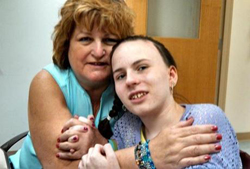Huffington Post – February 23, 2014
By Cristy Balcells
Justina Pelletier has been in the news lately. She’s a 15-year-old girl from West Hartford, CT who loves ice skating and going to the mall with friends. However, she’s not in the news for her accomplishments.
Justina and her older sister struggle with an invisible condition called mitochondrial disease. It is caused by a disruption in the cellular energy centers of our bodies, the mitochondria. The crisis inside her cells isn’t always apparent on the outside. But inside, they are teetering on a precarious cliff where the body’s demands exceed the body’s ability to supply enough energy to live and to thrive. For mito patients, it’s more than just being tired. It’s never having adequate fuel to operate necessary functions of our body. Justina’s gut stopped working a couple of years ago, a common problem for mito patients, resulting in a tube to help her digest and eliminate food. Mito patients also struggle with muscle weakness, pain, memory loss, erratic blood pressure, vision problems, hearing problems, and debilitating fatigue.
But, this is where Justina’s tale unravels from the pursuit of adequate medical care to a complicated legal debacle that, sadly, is happening all too often with mitochondrial disease patients and their families. At MitoAction, a family advocacy and support organization, we receive nearly four calls a month from families across the country facing scrutiny from their doctors when it comes to this difficult-to-diagnose-and-treat disease. In extreme cases, such as the Pelletiers, parents lose custody of their children for “medical child abuse.” This epic failure of the system is just too alarming to remain silent about.
When Justina got the flu in February 2013, her parents acted quickly. They knew that people with mitochondrial disease can decompensate rapidly when physiologically stressed from illness. Their primary mitochondrial disease doctor at Tufts Medical Center encouraged them to go to Boston Children’s Hospital where their gastrointestinal (GI) specialist just relocated. Justina and her parents made the 3-hour drive to Boston with hopes of a short wait so their GI doctor could help stabilize her.
 What should have been a fairly straightforward visit turned into a nightmare. Some of the doctors at Children’s Hospital disagreed with Justina’s existing mitochondrial diagnosis. Justina was in pain and upset. Psychologists were consulted. Justina’s parents demanded to see the GI doctor as expected and to consult with her Tufts physician. Justina’s pain and symptoms continued to go untreated while a battle of egos festered.
What should have been a fairly straightforward visit turned into a nightmare. Some of the doctors at Children’s Hospital disagreed with Justina’s existing mitochondrial diagnosis. Justina was in pain and upset. Psychologists were consulted. Justina’s parents demanded to see the GI doctor as expected and to consult with her Tufts physician. Justina’s pain and symptoms continued to go untreated while a battle of egos festered.
This could have been solved with a simple phone call to the Tufts physician managing Justina and her sister for their mitochondrial disorders. A conversation to hash out differing opinions among all involved is obviously what is best for the patient. It’s what we, the community, expect.
However, Children’s Hospital determined that there are too many “red flags” in Justina’s case and called in the state’s Department of Children and Families for a full investigation. Justina’s parents were accused of medical child abuse. They were told to be in court the next day. Remember – this Connecticut family was three hours from home, without a toothbrush much less a lawyer, and was expected to show up in court a day later ready to fight for their daughter.
Justina’s parents begged for her to be transferred to Tufts. Their request was refused. Justina’s mom started sending a balloon or a card every day to her in the hospital, telling her “I love you so much” and “Don’t give up.” Little did she know that those balloons would be the first of hundreds to be sent over the following year.
Justina was diagnosed with a psychiatric condition at Children’s Hospital, moved to a locked psychiatric unit, and was not treated for her current illness or for her mitochondrial disease, which necessitates a daily regimen of cellular supplements and dietary adjustments. Her body weakened. She complained she could not walk, felt nauseous, and had trouble eating. She was told her symptoms were all in her head, and behavioral therapies are forced upon her. Justina’s doctors — who had treated her at length — were never consulted. Family counseling was never offered as she got sicker, and the months went on.
This started 13 months ago, yet Justina is still in a medical facility and in the custody of Massachusetts. Hearing after hearing has come and gone for the last three months, with no real progress. The battle is really no longer about Justina. It’s about who is right: the parents, the hospital, or the state.
What none of the media is talking about is how shattered this experience has left this family. The damage is irreparable. Justina’s parents are consumed with grief, fear, suspicion, and desperation. And, Justina, the child who is “protected” by the law, has lived without the comfort and protection of a mom and dad and sisters for more than a year. Their lives have been destroyed. At what point did we become so detached that we can let this type of chaos and tragedy ensue for a week, much less for over a year? Where are the people who will stand up and insist “enough is enough!”?
Justina’s plight should be a deep-felt reminder to all of us of the tragic shortcoming of our ever-so-complex healthcare system. At a time when we boast about novel therapeutic discoveries, we find that our care of the chronically ill in areas such as chronic pain, mental illness, and chronic/rare disease is far short of acceptable. At a time of the digital age when we boast about information and access and we can talk to our phones like personal assistants, we find that physicians are pressured and seldom actually talk directly to one other (or even to their patients). And, care is anything but coordinated.
We won’t give up on Justina and her family. But this has to stop and cannot happen to some other family in the future. Enough is enough.
http://www.huffingtonpost.com/cristy-balcells/first-do-no-harm-how-we-f_b_4843997.html?utm_hp_ref=tw



SHARE YOUR STORY/COMMENT